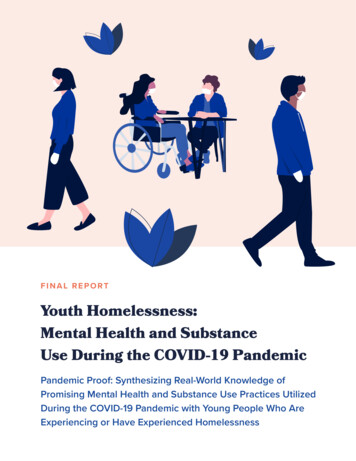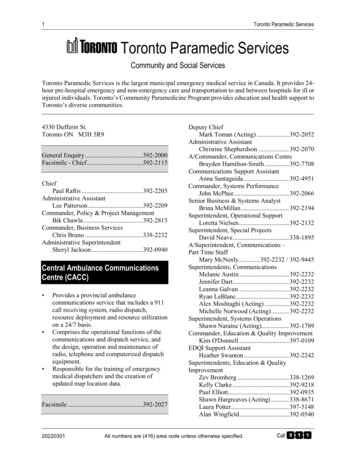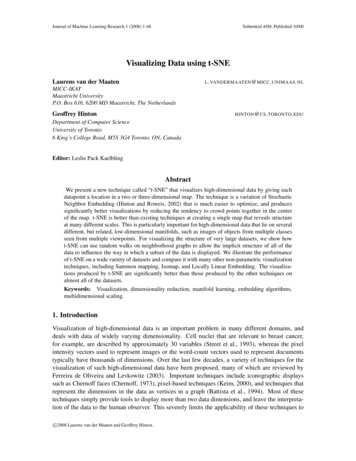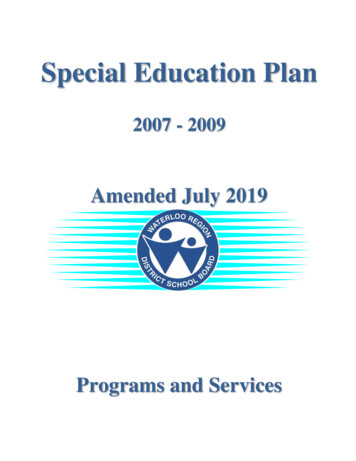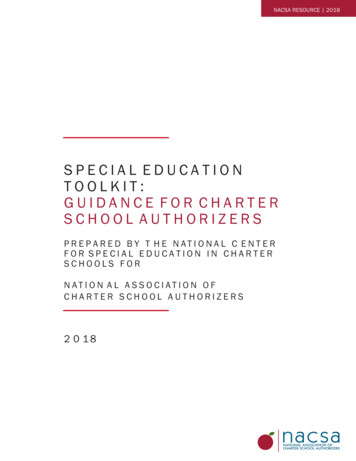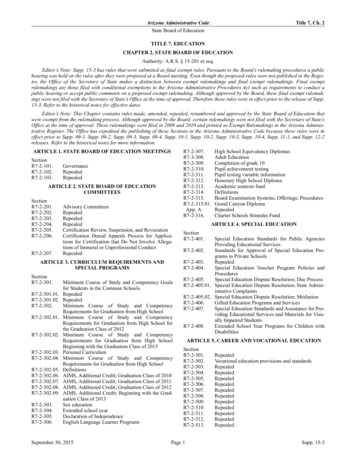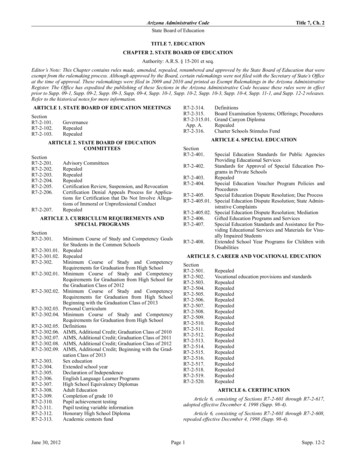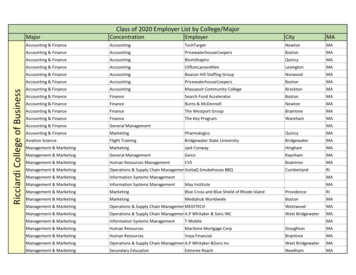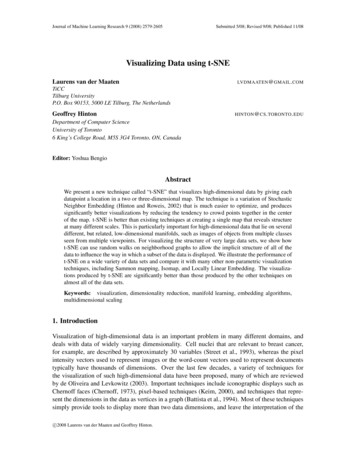
Transcription
GUIDE TOSPECIALEDUCATIONFOR PARENTS& GUARDIANSServing Our Students,Schools, & CommunitiesUpdated June 2020
The TDSB Special Education Plan is also guidedby the following principles:GUIDETO SPECIALE D U C AT I O NFOR PARENTS& GUARDIANSSpecial Education Plan 2020Learning CentresLearning Centres 2 & 3:140 Borough Drive,Scarborough, OntarioM1P 4N6(416)396-7968Learning Centres 1 & 4:1 Civic Centre Court,Etobicoke, OntarioM9C 2B3(416)394-4898TDSB MissionThe Toronto District School Board (TDSB) Special EducationPlan adheres to the TDSB Mission and Values Statements: All students, their families and the staff who supportthem have the right to be treated with respect. All students have the right to a program developed inresponse to their strengths and needs. All students have the right to a range of placements,programs, and services to meet their individualrequirements in their neighbourhood or Family ofSchools, wherever possible. All students and the staff who support them havethe right to a safe, accepting, welcoming, secure, andencouraging environment.We believe that active and meaningful collaboration with allstakeholders and a partnership of students, school, familyand support services is essential to the success of all students.For a copy of this year’s Special Education Plan visit:www.tdsb.on.ca/specialeducationThis Guide to Special Education for Parent(s)/Guardian(s)provides information about supports and services forstudents with special education needs in the TorontoDistrict School Board (TDSB). It sets out the Identification,Placement, and Review Committee (IPRC) proceduresinvolved in identifying a pupil as “exceptional”, in decidingon program placement and in appealing such decisionswhen parents* do not agree with the IPRC. (*Throughoutthis guide, the word “parents” includes guardians.)What is TDSB’s Vision forSpecial Education?Our Mission is to enable all students to reachhigh levels of achievements and to acquire theknowledge, skills and values they need to becomeresponsible members of a democratic society.We value: Each and every student A strong public education system A partnership of students, schools, familyand community The uniqueness and diversity of ourstudents and our community The commitment and skills of our staff Equity, innovation, accountability andaccessibility Learning environments that are safe,nurturing, positive and respectful2Special Education PlanTDSB’s Vision for Special Education is that students identifiedwith special education needs be welcomed, includedand supported within well-resourced neighbourhoodschools. We are committed to providing all students withequitable access to special education programs, servicesand resources in the most supportive and inclusiveenvironment for learning, to the fullest extent possible inthe local community.Who are students with special education needs?Students identified with special education needs oftenbenefit from greater support, accommodations anddifferentiated instruction in order to be successful inschool. The Education Act requires that school boardsprovide, or purchase from another board, special educationprograms and services for their exceptional pupils. TheMinistry of Education directs funding to school boards forthis purpose.tdsb.on.ca
What is a SpecialEducation Program?A special education program is defined in the Education Actas an educational program that: Is based on and modified by the results of continuousassessment and evaluation; and Includes a plan (called an Individual Education Plan orIEP) containing specific objectives and an outline ofspecial education services that meet the needs of theexceptional pupil.What are SpecialEducation Services?Special education services are defined in the EducationAct as the facilities and resources, including supportpersonnel and equipment, necessary for developing andimplementing a special education program.What special education programs and servicesare provided by the board?TDSB provides a full range of programs and services toensure that the needs of students are clearly identifiedand that the appropriate educational programs andservices are provided for them, whether in the regularclassroom, a specialized setting, or a combination ofboth. TDSB’s Special Education Plan reflects the board’scommitment to the development, implementationand consistent provision of effective special educationprograms and services to all students who need them,whether or not they are deemed to be “exceptional”. TheSpecial Education Plan can be found at: www.tdsb.on.ca/specialeducation.Individual Education PlanWhat is an Individual Education Plan (IEP)?An Individual Education Plan (IEP) is a written plan describingthe special education program and/or services developedfor a particular student. It outlines any accommodationsand special education services needed to assist the studentin achieving his or her learning expectations. It may alsoidentifies specific, measureable learning expectations thatare modified from or alternative to the expectations givenin the curriculum policy document for the grade levelsubject or course. Ontario Regulation 181/98 governs thedevelopment of IEPs.3Special Education PlanThe IEP must be developed in consultation with parents. Itmust include: Accommodations – strategies and supports that differfrom what is normally provided during instruction Appropriately specific and measureable educationalexpectations An outline of the special education program andservices that will be received A statement about the methods for reviewing yourchild’s progress A personalized transition plan with specific goalsand actions that build on student strengths, needsand required supports. If a student does not need atransition plan, the plan will state that no action isrequiredThe IEP must be completed within 30 school days after achild has been placed in a special education program andthe principal must ensure that parents receive a copy of it.An IEP can also be developed for students who have notbeen formally identified as exceptional but who requirespecial education programs and/or services. For moreinformation see: The Individual Education Plan (IEP) AResource Guide available at: d/guide/resource/.Who is identified as an “Exceptional” Pupil?The Education Act defines an exceptional pupil as “apupil whose behavioural, communicational, intellectual,and physical or multiple exceptionalities are such thathe or she is considered to need placement in a specialeducation program.” Students are identified through anIdentification, Placement and Review Committee (IPRC)process, according to the categories and definitions ofexceptionalities provided by the Ministry of Education.Categories include Behaviour, Communication, Intellectualand Physical Exceptionalities.Identification,Placement, and ReviewCommittee (IPRC)What is an Identification, Placement, andReview Committee (IPRC)?Students being considered for identification of anexceptionality and special education programs and/orservices may be presented to an Identification, Placement,and Review Committee (IPRC). Ontario Regulation 181/98requires that all school boards set up IPRCs. It also setsout the procedures involved in identifying a pupil astdsb.on.ca
“exceptional”, deciding the pupil’s placement and appealingsuch decisions when the parent does not agree with theIPRC. The committee is composed of at least three persons,one of whom must be a principal or supervisory officer ofthe board. Resident students enrolled in and attending aTDSB school are eligible for consideration by a TDSB IPRC.What does the IPRC do?The IPRC will: Decide whether or not your child should be identifiedas an exceptional pupil Identify the areas of your child’s exceptionality,according to the categories and definitions ofexceptionalities provided by the Ministry of Educationinformation or clarification, such as your child’s teacher,special education staff, board support staff, or therepresentative of an agency A translator or an interpreter, if one is required (Youcan request the services of a translator or an interpreterthrough the principal of your child’s school.)What information will parents receive aboutthe IPRC meeting?Within 15 days of giving you notice of an IPRC, or receivingyour request, the principal will provide you with writtennotification of approximately when the IPRC will meet. Atleast ten days in advance of the meeting, you will receivean invitation to attend the meeting as an important partnerin considering your child’s placement. This letter will notifyyou of the date, time, and place of the meeting, and it willask you to indicate whether or not you will attend. Decide an appropriate placement for your child:Decidean appropriate placement Regular Class with Indirect Support, ResourceAssistance or Withdrawal AssistanceBefore the IPRC meeting occurs, you will receive a writtenfor yourchild:Special EducationClass with Partial Integration orcopy of any information about your child that the membersRegular Class with Indirect Support, Resource Assistance orWithdrawal AssistanceSpecial Education Class with Partial Integration or Full TimeFull Time Review the identification and placement at least oncein each school yearof the IPRC have received. This may include the results ofassessments or a summary of information.How is an IPRC meeting requested?What if parents are unable to attend thescheduled meeting?An IPRC can be requested by the principal of your child’sschool or in writing by parents. The principal:If you are unable to make the scheduled meeting, you may: May, in consultation with the School Support Team(SST) and with written notice to you, refer your childto an IPRC when the principal believes that your childmay benefit from a special education program Must request an IPRC meeting for your child, uponreceiving your written requestWithin 15 days of receiving your request, or of giving younotice, the principal must provide you with a copy of thisguide and a written statement of approximately when theIPRC will meet.May parents attend the IPRC meeting?Regulation 181/98 entitles parents and pupils 16 years ofage or older: To be present at and participate in all committeediscussions about your child To be present when the committee’s identification andplacement decision is madeWho else may attend an IPRC meeting?The principal (or vice principal) of your child’s school willattend. You or the principal may request the attendance ofothers at the IPRC meeting, such as: Your representative, that is, a person who may supportyou or speak on behalf of you or your child Other resource people who may provide additional4Special Education Plan Contact the school principal to arrange an alternativedate or time Let the school principal know you will not be attendingand advise the principal of issues that he or she maytake forward to the IPRC on your behalfIf you do not attend, as soon as possible after the meeting,the principal will forward to you, for your considerationand signature, the IPRC’s written statement of decision.The statement will note the decision of identification andplacement and any recommendations regarding specialeducation programs and services.What happens at an IPRC meeting? The chair of the IPRC introduces everyone and explainsthe purpose of the meeting The IPRCwill reviewall availableinformationaboutTheIPRCwillreviewall availableyour child. The committee will: Consider an educationalof your childinformationabout assessmentyour child. Consider, subject to the provisions of the HealthConsent Act, 1996,a health or psychologicalThe Carecommitteewill:assessment of your child conducted by aqualified practitioner, if they feel that suchan assessment is required to make a correctidentification or placement decision Interview your child if the committee considersit useful to do so (Your consent is required if yourchild is less than 16 years of age)tdsb.on.ca
Consider any information that you submit aboutyour child, or that your child submits if he or she is16 years of age or older The committee may discuss any proposal that hasbeen made about a special education program orspecial education services for the child. Committeemembers will discuss any such proposal at yourrequest or at the request of your child, if the child is16 years of age or older You are encouraged to ask questions and join in thediscussion. Following the discussion, after all the information hasbeen presented and considered, the committee willmake its decisionsWhat will the IPRC consider in making itsdecision about exceptionality?The IPRC will consider all of the information presentedabout your child in light of the Ministry definitions for thedifferent exceptionalities and TDSB criteria for differentkinds of program support.What will the IPRC consider in making itsplacement decision?Before the IPRC can consider placing your child in a specialeducation class, it must consider whether placement in aregular class with appropriate special education services will: Meet your child’s needs, and Be consistent with your preferencesIf, after considering all of the information presented to it, theIPRC is satisfied that placement in a regular class will meetyour child’s needs and that such a decision is consistentwith your preferences, the committee will decide in favourof placement in a regular class with appropriate specialeducation services.If the committee decides that your child should be placed ina special education class, it must state the reasons for thatdecision in its written statement of decision.What will the IPRC’s written statement ofdecision include?The IPRC’s written statement of decision will state: The IPRC’s description of your child’s strengths and needs Whether the IPRC has identified your child as exceptional Where the IPRC has decided that your child shouldbe placed in a special education class, the reasons forthat decisionWhat happens after the IPRC has made itsdecision? The chair of the IPRC will sign the statement of decisionand review it with you. If you agree with the identification and placementdecisions made by the IPRC, you will be asked toindicate this by signing your name on the statement ofdecision. It may be signed at the IPRC meeting or takenhome and returned later to your child’s school principal. No committee placement decision can beimplemented unless you have consented to thedecision, or unless the time limit for filing a notice ofappeal about the decision has expired and no suchnotice has been filed.the IPRC has identified your child as an exceptionalIf IfpupiltheIPRChasand youhave agreedwith theidentifiedIPRC identification yoand placement decisions, the following will take place: Whereplacementnot special education classchildasan isexceptionalfull time and your child remains at his or hercurrent school, the appropriate school staff willpupilandofyoube informedthe need to develop an IndividualEducation Plan (IEP) for your child. Whereplacement is a specialeducationfullhaveagreedwiththeclassIPRCtime or with partial integration with intensiveprogram support, the appropriate specialeducation coordinator andwill be directedto prepareidentificationplacementan “offer of placement” and assist the homeschool principal with arranging a visit to thedecisions,thefollowingproposed placementfor youand your child. Following the visit, you will be asked to indicateacceptanceor refusal of the offer ofwill yourtakeplace:placement. The offered placement will notWhere placement is not special education class full time and yourchild remains at his or her current school, the appropriateschool staff will be informed of the need to developan Individual Education Plan (IEP) for your child.Where placement is a special education class full time or with partialintegration with intensive program support, the appropriatespecial education coordinator will be directed to preparean “offer of placement” and assist the home school principalwith arranging a visit to the proposed placement for youand your child.proceed without your signed acceptance.What can parents do if they disagree with theIPRC decision?If you do not agree with either the identification orplacement decision made by the IPRC, you may: Within 15 days of receipt of the decision, requestthat the IPRC hold a second meeting to discuss yourconcerns and revisit the decisions; or Within 30 days of receipt of the decision, file a noticeof appeal Where the IPRC has identified your child as exceptional:WheretheIPRCIf, after a second meeting, you do not agree with the The categoriesand definitionsof anyhas identifieddecision, you may, within 15 days of your receipt of theexceptionalities identified, as they are defined bydecision at the second meeting, file a notice of appeal.the Ministry of Educationyourchildasexceptional: The IPRC’s placement decisionIf you do not consent to the IPRC decision and you do not The IPRC’s recommendations regarding a specialeducation program and special education services5Special Education Planappeal it, the Board will instruct the principal to implementthe IPRC decision.tdsb.on.ca
How do I appeal an IPRC decision?If you disagree with the IPRC’s identification of your childas exceptional or with the placement decision of theIPRC, you may, within the timelines described above, givewritten notification of your intention to appeal the decision.This written notice should be addressed to: Director andSecretary Treasurer, Toronto District School Board, 5050Yonge Street, Toronto, ON, M2N 5N8.The notice of appeal must: Indicate the decision(s) with which you disagree Include a statement that sets out your reasons fordisagreeingmaking an application to the tribunal will be includedwith the appeal board’s decision.Once a child has been placed in a SpecialEducation Program, can the placement bereviewed?A Review IPRC meeting will be held within the school year,unless the principal of the school at which the specialeducation program is being provided receives written noticefrom you, the parent, dispensing with the annual review.A request for a Review IPRC meeting may be made any timeafter your child has been in a special education program forthree months.What happens in the appeal process?What does a Review IPRC consider and decide?The appeal process involves the following steps:The IPRC conducting the review will consider the samekinds of information that were originally considered by theprevious IPRC. It will also consider the progress your childhas made in the special education program and, with yourwritten permission, will reference the IEP. The Board will establish a special education appealboard to hear your appeal. The appeal board willbe composed of three persons who have no priorknowledge of the matter under appeal. One of thethree is to be selected by you and one by the board.(For more about membership see Regulation 181/98.) The chair of the appeal board will arrange a meeting, totake place at a convenient time and place, but no laterthan 30 days after he or she has been selected (unlessparents and board both provide written consent to alater date). The appeal board will receive the material reviewedby the IPRC and may interview any persons who maybe able to contribute information about the matterunder appeal. You, the parent, and your child (if he or she is 16years old or over), are entitled to be present at and toparticipate in, all discussions.The IPRC will review the placement and identificationdecisions and decide whether they should be continued orwhether a different decision should now be made.What if my child is new to the board and has extremelycomplex special needs but has not been to an IPRC?Special Education ReviewCommittee (SEPRC)The Toronto District School Board (TDSB) is committed tomaking sure that students with special education needsreceive the appropriate programs and/or services tomeet those needs from the day they first begin attendinga TDSB school. The appeal board must make its recommendationTheappeal board must make its recommendationwithin 3 days of the meeting’s ending. It may: Agreethe IPRCand recommend that thewithin3 withdaysof theWhat is a SEPRC?decision be implemented, orStudents new to the TDSB with extremely complex medicalmeeting’sending.It may: Disagree withthe IPRC andmake arecommendation to the board about your child’sidentification or placement, or both. The appeal board will report its recommendations inwriting, to you and to the school board, providing thereasons for its recommendations. Within 30 days of receiving the appeal board’s writtenstatement, the school board will decide what actionit will take with respect to the recommendations.(Boards are not required to follow the appeal boardrecommendation.) You may accept the decision of the school board, oryou may appeal to a Special Education Tribunal. Youmay request a hearing by writing to the Secretary ofthe Special Education Tribunal. Information about6Special Education Planneeds may be considered for immediate placement in anintensive support special education program. Usually, theseare children who have been receiving intensive, full timespecial education class support in other school systems(daycare) prior to their arrival in the TDSB.Special Education Class placement normally requires anIdentification, Placement and Review Committee (IPRC)decision, which cannot take place until the child has beenattending for sufficient time to permit school staff to collectthe required information and documentation. To addressthis delay and avoid the disruption to a student’s schoolingthat would be caused by a program move part way throughthe year, the TDSB developed a process for expedited(but conditional) placement of students who are newlytdsb.on.ca
registered (on paper) but not yet attending a TDSB school.A SEPRC meeting is optional. A SEPRC should only beinitiated if the child has extreme complex medical needsthat are medically documented and when parents believethat placement in a TDSB special education class (IntensiveSupport Program) would better meet their child’s needs.Students who would go through the SEPRC process wouldalso likely qualify for the same level of support when anIPRC is eventually held. Parent(s)/Guardian(s) may refusethe opportunity for a SEPRC meeting and have their childattend their neighbourhood school.Subject to parental preference, the principal will consultwith the Inclusion Consultant to review the medicaldocuments shared by the parents to confirm if a referral toa SEPRC is appropriate and to consider the child for possibleSpecial Education Class placement.When parents decline participation in a SEPRC, they donot forgo their right to request an IPRC once their child isattending school. When parents agree to participate in aSEPRC, they can still decline a recommended placementand have their child attend the neighbourhood school.SEPRC StructureThe membership of a SEPRC is the same as for an IPRC. TheTDSB has the following SEPRC uage,occupational/physiotherapy assessments or other relevantdocumentation that addresses the medically complexspecial education needs of their child with the principal.The principal will explore the opportunity for a SEPRC withthe Special Education Consultant meeting if the parentssupport the possibility of special education class placementimmediately upon enrollment and would like a SEPRCmeeting to be considered. Parents can decline a SEPRC andtheir child will attend the home school.The principal may request access to central resources forthe purpose of carrying out an observation, gatheringadditional information about the child’s needs or clarifyingexisting documentation.Once the referral package is approved by the Special EducationConsultant and Coordinator, an invitation letter to a SEPRCmeeting is prepared and sent by the Office Administrators inthe Special Education Department to the parent and a copy issent electronically to the home school principal.Parent(s)/Guardian(s) return the response form to staffat their home school or confirm their attendance bytelephone to staff of the home school, who then notifies theappropriate Special Education Coordinator.Parent(s)/Guardian(s) receive a copy of all documentationto be considered at the SEPRC with the letter of invitation MembershipforLearningLearningNetworkNetwork SEPRCsMembershipforSEPRCs Each of theand a copy of the TDSB Guide to Special Education forEachof the fourregionalLearningin thefourregionalLearningCentresinCentresthe TDSBisTDSBorganizedParent(s)/Guardian(s).is organized into clusters of schools called LearningintoclustersWithinof schoolsLearningDocuments Required for a SEPRCNetworks.each calledLearningNetwork,Networks.teams areWithineach LearningNetwork,teamsare withinestablishedto meet asthe SEPRCfor schoolsThe documentation presented to the SEPRC mirrors thatthe Network.whoSEPRCare knowledgeableaboutestablishedto Principalsmeet as thefor schoolswithin required for students who are presented to an Identification,special education policy and procedures are invited byPlacement and Review Committee (IPRC) seeking a similarthetheNetwork.Principalswho are knowledgeableSpecial EducationDepartmentto be the Chair of aplacement and may include:LearningNetworkSEPRC.policyThe committeesare made upaboutspecialeducationand proceduresof the following members: An educational assessmentare invited by the Special Education Department Principal (Chair) who is not associated with the The most recent Provincial Report Card (and where theto be theChairorofthea student’sLearningschoolNetwork SEPRC.studentmost recent report card is the Progress Report Card, theThe committeesaremadeupofthefollowingprevious Provincial Report Card is also included) Special Education Coordinatormembers: An Individual Education Plan (IEP) Psychological Services Representative Membership for aforCentralSEPRCMembershipa CentralSEPRC TheThe Central SEPRC is made up of the following members,CentralSEPRCistomadeup Centre:of theall of whomare attachedthe Learning CentrallyAssigned PrincipalEducationfollowingmembers,all ofofSpecialwhomare(Chair)attachedthe Learning SpecialtoEducationCoordinator Centre:Managerof PsychologicalServices Managerof PsychologicalServicesSEPRC Referral StepsParent(s)/Guardian(s) pre-register the student in thehome school by address and share any educational,behavioural, medical/health (hearing, vision, physical,7Special Education Plan A psychological assessment Other relevant professional assessments (e.g., speechlanguage, OT/PT, medical) A Developmental History Form (for Junior Kindergartento Grade 2 aged students) A current professional observation Student work samples (part of the presentation) Any documents which parent(s)/guardian(s) may deemrelevant to a SEPRCAttendance at and Presentations to a SEPRCSince students presented to a SEPRC are not yet TDSBtdsb.on.ca
students, parent(s)/guardian(s) must be in attendance forthe SEPRC meeting to proceed: The principal from the referring school arranges for aninterpreter to assist the parent(s)/guardian(s) whereappropriate An administrator from the referring school mustattend to provide a general overview of the student’shistory and to understand the full context of the SEPRCdiscussion and recommendation to guide follow-upaction at the school Parents are encouraged to invite any resource peoplecurrently involved with the student to attend theSEPRC meeting The SEPRC Chair invites parent(s)/guardian(s) and anyother attendees to participate in discussions aboutthe student, to determine current strengths, needs,academic performance and presenting issues. Worksamples, if available, are reviewed to provide a senseof the student’s potential and performance in thecurrent settingFunctions of the SEPRCWhen parent(s)/guardian(s) are in agreement, a SEPRC isarranged to determine eligibility for special education classplacement of a pre-registered but not yet attending studentand to make a recommendation about such placement. TheSEPRC will: Determine whether the support available in a specialeducation class would be appropriate for a studentwhen starting to attend a TDSB school For programming purposes only, note whether thestudent meets the requirements for an exceptionalitybased on TDSB criteria. (An IPRC decision is required toformally identify a student as exceptional.) Provide a written statement of recommendationsoutlining the student’s strengths and needs and anyprogram/services recommendations of the SEPRCkindergarten will have their program recommendation reevaluated in the spring at an SST meeting, to determine ifthe recommended full time support should continue forsenior kindergarten and have an IPRC during their finalkindergarten year in preparation for the primary division.Appeal ProcessThere is no formal appeal process for SEPRCrecommendations. The students under considerationare not yet attending school under the jurisdiction ofthe school board. The SEPRC function does not providea decision about exceptionality and can only make arecommendation about conditional placement in aspecial education class, requiring a follow-up IPRC (whosedecisions can be appealed).When the parent(s)/guardian(s) decide not to accept a SEPRCrecommended placement, or when special education classplacement is not recommended by the SEPRC, the studentattends the neighbourhood school and the school’s specialeducation resources will be available to provide support.The nature of support will be determined through theschool’s IST (In-School Team) or SST (School Support Team)process. Parent(s)/Guardian(s) continue to have the rightto request (in writing to the principal) that the student beconsidered for special education class placement by anIdentification, Placement and Review Committee.Is a SEPRC meeting li
Special Education Plan. GUIDE TO SPECIAL EDUC A TION FOR PARENTS & GUARDIANS . Special Education Plan 2020. The Toronto District School Board (TDSB) Special Education Plan adheres to the TDSB Mission and Values Statements: What is TDSB's Vision for Special Education? Learning Centres 2 & 3: 140 Borough Drive, Scarborough, Ontario . M1P 4N6 .
